- Home
- Tom Stoppard
Rock 'N' Roll
Rock 'N' Roll Read online
Rock ‘n’ Roll
PLAYS
Rosencrantz and Guildenstern Are Dead *
Enter a Free Man *
The Real Inspector Hound *
After Magritte *
Jumpers *
Travesties *
Dirty Linen and New-Found-Land *
Every Good Boy Deserves Favour *
Night and Day
Dogg’s Hamlet, Cahoot’s Macbeth *
Undiscovered Country
(adapted from Arthur Schnitzler’s Das weite Land)
On the Razzle
(adapted from Johann Nestroy’s Einen Jux will er sich machen)
The Real Thing
Rough Crossing
(adapted from Ferenc Molnár’s Play at the Castle)
Dalliance
(adapted from Arthur Schnitzler’s Liebelei)
Hapgood
Arcadia
Indian Ink
(an adaptation of In the Native State)
The Invention of Love *
Voyage: The Coast of Utopia Part I *
Shipwreck: The Coast of Utopia Part II *
Salvage: The Coast of Utopia Part III *
Rock ‘n’ Roll *
TELEVISION SCRIPTS
A Separate Peace
Teeth
Another Moon Called Earth
Neutral Ground
Professional Foul
Squaring the Circle
RADIO PLAYS
The Dissolution of Dominic Boot
“M” Is for Moon Among Other Things
If You’re Glad, I’ll Be Frank
Albert’s Bridge
Where Are They Now?
Artist Descending a Staircase
The Dog It Was That Died
In the Native State
SCREENPLAYS
Rosencrantz & Guildenstern Are Dead
Shakespeare in Love (with Marc Norman)
FICTION
Lord Malquist & Mr. Moon*
* Available from Grove Press
Rock ‘n’ Roll
TOM STOPPARD
Copyright © 2006 by Tom Stoppard
All rights reserved. No part of this book may be reproduced in any form or by any electronic or mechanical means, or the facilitation thereof, including information storage and retrieval systems, without permission in writing from the publisher, except by a reviewer, who may quote brief passages in a review. Any members of educational institutions wishing to photocopy part or all of the work for classroom use, or publishers who would like to obtain permission to include the work in an anthology, should send their inquiries to Grove/Atlantic, Inc., 841 Broadway, New York, NY 10003.
CAUTION: Professionals and amateurs are hereby warned that Rock ‘n’ Roll is subject to a royalty. It is fully protected under the copyright laws of the United States, Canada, United Kingdom, and all British Commonwealth countries, and all countries covered by the International Copyright Union, the Pan-American Copyright Convention, and the Universal Copyright Convention. All rights, including professional, amateur, motion picture, recitation, public reading, radio broadcasting, television, video or sound taping, all other forms of mechanical or electronic reproduction, such as information storage and retrieval systems and photocopying, and rights of translation into foreign languages, are strictly reserved.
First-class professional, stock, and amateur applications for permission to perform it, and those other rights stated above, must be made in advance to Peters, Fraser & Dunlop, Drury House, 34-43 Russell Street, London, WC2B 5HA, England, ATTN: Kenneth Ewing, and paying the requisite fee, whether the play is presented for charity or gain and whether or not admission is charged.
Printed in the United States of America
FIRST AMERICAN EDITION
eBook ISBN-13: 978-0-8021-9536-4
Grove Press
an imprint of Grove/Atlantic, Inc.
841 Broadway
New York, NY 10003
Distributed by Publishers Group West
www.groveatlantic.com
For Václav Havel
ACKNOWLEDGMENTS
My first debt is to Václav Havel, whose essays, commentaries and letters from 1965 to 1990 and beyond were not just indispensable to the play but a continual inspiration in the writing. I am indebted, too, to Paul Wilson and Jaroslav Riedel for many helpful conversations about the Plastic People of the Universe and the Rock ‘n’ Roll scene in Czechoslovakia. My thanks are due to David Gilmour, Tim Willis, Martin Deeson, Trevor Griffiths, Eric Hobsbawm, David West, Peter Jones and many others who allowed me to bother them with my questions.
T.S.
INTRODUCTION
In the first draft of Rock ‘n’ Roll Jan was called Tomas, my given name which, I suppose, is still my name. My surname was legally changed when I was, like Jan, unexpectedly ‘a little English schoolboy’.
This is not to say that the parallels between Jan’s life and mine go very far. He was born where I was born, in Zlin, and left Czechoslovakia for the same reason (Hitler) at much the same time. But Jan came directly to England as a baby, and returned to Czechoslovakia in 1948, two years after I arrived in England having spent the war years in the Far East.
The two-year overlap was the basis of my identification with Jan, and why I started off by calling him Tomas. His love of England and of English ways, his memories of his mother baking buchty and his nostalgia for his last summer and winter as an English schoolboy are mine.
If that had been the whole play (or part of a play I’d often thought about writing, an autobiography in a parallel world where I returned ‘home’ after the war), Tomas would have been a good name for the protagonist. But with Rock ‘n’ Roll the self-reference became too loose, and, for a different reason, misleading, too, because I also had in mind another Tomas altogether, the Tomas of Milan Kundera’s novel The Unbearable Lightness of Being.
In that book there is a scene where Tomas refuses to sign a petition on behalf of political prisoners gaoled by Husák’s ‘government of normalisation’, which followed the invasion by the Warsaw Pact armies. In the play, when Jan is asked to sign what is essentially the same petition at the same juncture, his response is taken directly from Kundera’s Tomas, in distillation:
Jan No, I won’t sign it. First because it won’t help Hubl and the others, but mainly because helping them is not its real purpose. Its real purpose is to let Ferdinand and his friends feel they’re not absolutely pointless. It’s just moral exhibitionism … All they’re doing is exploiting the prisoners’ misfortune to draw attention to themselves. If they’re so concerned for the families they should go and do something useful for the families, instead of—for all they know—making things worse for the prisoners.
However, the primary source for this is not The Unbearable Lightness of Being but a polemical exchange years earlier between Kundera and Václav Havel, which prefigured not only Tomas’s (and now Jan’s) accusation of ‘moral exhibitionism’ but also Jan’s half of his argument with his activist friend Ferdinand, where Jan insists that the Prague Spring was by no means ‘defeated’ by the Russian invasion. ‘The new politics’ had ‘survived this terrible conflict’, Kundera wrote at the time. ‘It retreated, yes, but it did not disintegrate, it did not collapse.’ Intellectual life had not been shackled. The police state had not ‘renewed itself.
Kundera’s essay—titled ‘Czech Destiny’, or perhaps ‘The Czech Lot’—was published in December 1968, four months after the invasion. The fact that it was published at all may have been thought to support its argument—
Jan For once this country found the best in itself. We’ve been done over by big powerful nations for hundreds of years but this time we refused our destiny.
But Havel was having none of it. Disa
ster was not a moral victory, and, as for ‘destiny’, Havel wrote, Kundera was indulging in a mystical self-deception and refusing to face plain fact. In the play, Ferdinand is briefer and ruder—‘It’s not destiny, you moron, it’s the neighbours worrying about their slaves revolting if we get away with it.’
Kundera fired back a few months later (‘moral exhibitionism’), and it should be said that both writers would have cause for complaint if the play purported to deploy their arguments fairly. Dramatists become essayists at their peril. The play does not take account of Havel’s Parthian shot in an interview years later:
All those who did not sign or who withdrew their signatures argued in ways similar to Tomas in Kundera’s novel… Naturally the president [Husák] did not grant an amnesty, and so Jaroslav Sabata, Milan Hubl and others went on languishing in prison, while the beauty of our characters was illuminated. It would seem, therefore, that history proved our critics to be right. But was that really the case? I would say not. When the prisoners began to come back after their years in prison, they all said that the petition had given them a great deal of satisfaction. Because of it, they felt that their stay in prison had a meaning: it helped renew the broken solidarity … But it had a far deeper significance as well: it marked the beginning of a process in which people’s civic backbone began to straighten again. This was a forerunner to Charter 77 …
The scene between Ferdinand and Jan when Ferdinand has just had a spell in prison is again in debt to a robust exchange of essays, this time between Havel and the novelist Ludvik Vaculik in December and January 1978/9. I moved the conversation forward to 1975 (otherwise it would have had to occur in the interval); is not quite fair to ‘Notes on Courage’ by Vaculik, because the stress for dissident intellectuals must have been worse after the watershed of Charter 77. Vaculik, like Jan, says that he’s afraid of prison. He is looking for a ‘decent middle ground’, and, like Jan, sees himself as a ‘normal person.’ ‘Normal people are not “heroes.”’ Echoing Vaculik, Jan complains to Ferdinand that heroism isn’t honest work, the kind that keeps the world going round: ‘It offends normal people and frightens them. It seems to be about some private argument the heroes are having with the government on our behalf, and we never asked you.’ Heroic acts didn’t spring from people’s beliefs—‘I believe the same as you do’—they sprang from character and ‘It’s not the action of a friend to point out that your character is more heroic than mine.’
A related point was made in another samizdat essay, by Petr Pithart, which made its appearance at almost the same time. This spoke for a ‘passive majority’ of like-believers against an ‘active minority’ of ‘self-anointed activists’. This minority, said Pithart, alluding to the Charter ‘spokesmen’, inevitably became ever more absorbed in its internal problems and quarrels and lost touch with the concerns of the majority.
Havel, again in samizdat (the days of open publication were long past), replied to both Vaculík and Pithart as he had to Kundera ten years before, unrepentantly. All of these deeply pondered, deeply felt exchanges between intellectuals and friends living under pressures hardly imaginable by writers in the West would support a whole play of political and moral philosophy. But that play is not Rock ‘n’ Roll.
If it had been, if the playwright hadn’t had other fish to fry in his allotted time, it would have been Ferdinand’s role to speak for Havel. That’s why I named him Ferdinand. In the first draft, Ferdinand had a surname, Vanek. ‘Ferdinand Vanek’ is the name of a character in three of Havel’s plays—Audience, Private View and Protest—where he stands in for the author. Vanek is a banned playwright. In Audience he is employed in a brewery, just as Havel was in 1974.
I had worked out that, in my play, Tomas (later Jan) would need a foil who would be taking Havel’s viewpoint in the dialectic. All of a sudden I had the inspiration of borrowing ‘Ferdinand Vanek’ for the role. A moment later, in my delight at this idea, I thought of placing one of my Vanek-Tomas scenes in that very brewery and even, perhaps, including the brewmaster who was the second character in Audience.
During a visit to Prague I had the opportunity to ask Havel’s permission to use his character in my unwritten play. He gave it without demur. He said it would be an honour. He didn’t seem especially surprised by my brilliantly original notion. Not until I came to be writing these notes did I discover that I was at last count the fourth author to put ‘Ferdinand Vanek’ into his own play.
Not only that, I had met two of the other three (as well as Havel) when I first went to Prague in 1977. Pavel Landovsky, an actor, was the first to have the idea. His ‘Vanek’ trod the boards in Germany in a full-length play in 1976. (The play failed, Landovsky says, because the title, Sanitation Night, had been translated as Closed for Disinfection, and this fatal phrase turned away anyone disposed to enter the theatre.) Two years later, the playwright and novelist Pavel Kohout wrote his own Vanek play, which was put on the following year in Vienna with Havel’s third Vanek play, Protest, in a double-bill. The third author, Jiśí Dienstbier, not only wrote a Vanek play, he included the brewmaster, too. I had been trumped three times over before I had played my card. (What made it all the more piquant was that I had put Kohout into a play of mine, Dogg’s Hamlet, Cahoot’s Macbeth, which was staged in London in the same month Kohout’s first Vanek play—he wrote two more—was receiving its premiere in Vienna.)
By the time I caught up on all this,1 Ferdinand had lost his surname anyway. I didn’t know, when I began, that in the second half of my play it would be Jan, and not Ferdinand, who would be Havel’s spirit. I ought to have realised that I wouldn’t be able to—or wish to—sustain Jan as a cautious dissenter from dissent. Whether or not Tomas (that is, I myself) would have signed the Charter and gone jobless or even to gaol is something I’ll never know, but if, in my parallel biography, I had kept my head below the parapet, it would have been out of fear and timidity, not out of disagreement with Havel’s philosophical and political writing.
Jan, at any rate, changes. He no longer takes his cues from Kundera or Vaculik, or from the bohemian underground, which deprecated the ‘official opposition’ of banned writers, artists and intellectuals (‘a bunch of tossers’). In the second act, he takes over Vanek’s mantle from Ferdinand, at least by implication. In temperament Vanek could not really be either a Ferdinand or a Jan; his nature is too polite and reticent. But Jan now takes his cues from Havel.
The most important sources for the ‘Czech arguments’ in this play are the essays, articles and letters written by Havel between 1968 and the 1990s. I’d had most of them on my shelves since publication but had been lazy about reading them properly. (An exception was a speech, ‘Politics and Conscience’, read out in absentia in Toulouse when Havel was awarded an honorary doctorate from that university but prevented from travelling there to receive it. At his request I represented him on that occasion.) When I did read them all within the space of a few weeks in 2004 I was left with an overwhelming sense of humility and pride in having a friend of such bravery, humanity and clear-sighted moral intelligence; who, moreover, as was clear even in translation, was as complex and subtle in his long paragraphs as he was adroit in his dialogues. The open letter titled ‘Dear Dr. Husák’ (1975) and the long essay, ninety pages in my edition, called ‘The Power of the Powerless’ (1978) were influential in their own time and place, but transcend both and will continue to be important wherever ‘living in truth’ requires not merely conscience but courage.2
*
Rock ‘n’ Roll manages to allude to only a tiny fraction of Havel’s writing. The Toulouse speech by itself is a mine of timely reminders of the need to put morality above politics, and nature above scientific triumphalism; to return life to its human scale, and language to its human meaning; to recognise that socialism and capitalism in their selfish forms are different routes to global totalitarianism. A later essay, ‘Stories and Totalitarianism’ (1987), provides Jan with his dialogue about there being ‘no stories in Czecho
slovakia … We aim for inertia. We mass-produce banality’; and about pseudo-history in pseudo-newspapers. The assertion that Czechoslovakia’s need is deeper than a return to Western democracy is one of a hundred striking moments in ‘The Power of the Powerless’. It is in the same essay that Havel observes that ‘living in truth’ could be any means by anyone who rebels against being manipulated by the Communist regime: it could be attending a rock concert.
*
Even if Rock ‘n’ Roll were entirely about the Czech experience between the Prague Spring and the Velvet Revolution, it could only hope to be a diagram. Yet, a diagram can pick out lines of force which may be faint or dotted on the intricate map of history that takes in all accounts. Rock ‘n’ Roll crystalised around one short essay by Havel, ‘The Trial’ (1976), and a few pages in a book-length interview from 1985. (Havel worked on the transcript, which became the first samizdat book to be legally published in post-Communist Czechoslovakia. Translated by Paul Wilson under the title Disturbing the Peace, it was published in England by Faber and Faber in 1990.)
The interviewer, Karel Hvizdala, asked about the origin of Charter 77. Havel’s reply began like this:
For me personally, it all began sometime in January or February 1976. I was at Hradecek, alone, there was snow everywhere, a night blizzard was raging outside. I was writing something, and suddenly there was a pounding on the door, I opened it, and there stood a friend of mine, whom I don’t wish to name, half-frozen and covered with snow. We spent the night discussing things over a bottle of cognac he’d brought with him. Almost as an aside, this friend suggested that I meet Ivan Jirous … I already knew Jirous; I’d met him about twice in the late 1960s but I hadn’t seen him since then. Occasionally I would hear wild and, as I discovered later, quite distorted stories about the group of people that had gathered round him, which he called the underground, and about the Plastic People of the Universe, a nonconformist rock group that was at the centre of this society; Jirous was their artistic director.

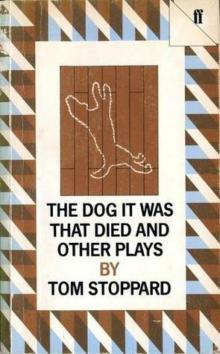 The Dog It Was That Died and Other Plays
The Dog It Was That Died and Other Plays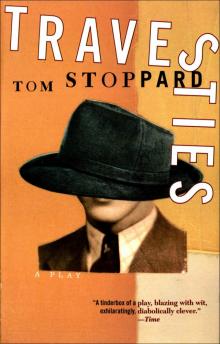 Travesties
Travesties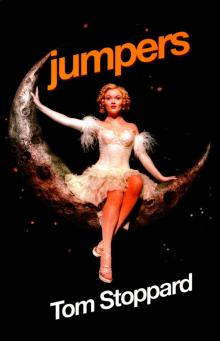 Jumpers
Jumpers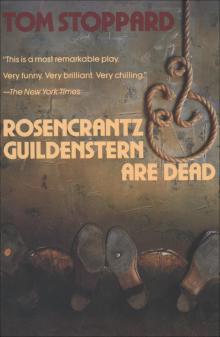 Rosencrantz and Guildenstern Are Dead
Rosencrantz and Guildenstern Are Dead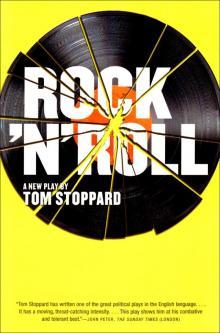 Rock 'N' Roll
Rock 'N' Roll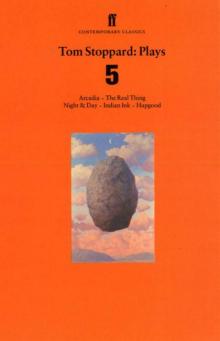 Plays 5
Plays 5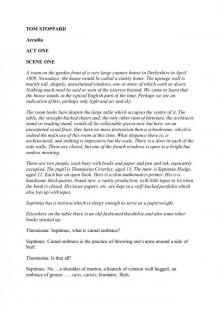 Arcadia
Arcadia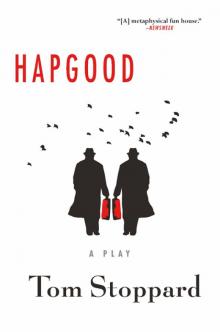 Hapgood
Hapgood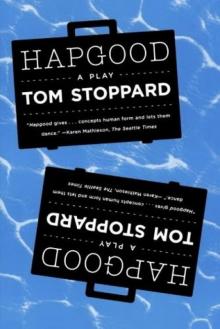 Hapgood: A Play
Hapgood: A Play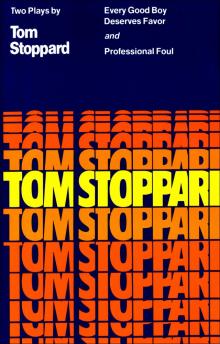 Every Good Boy Deserves Favor & Professional Foul
Every Good Boy Deserves Favor & Professional Foul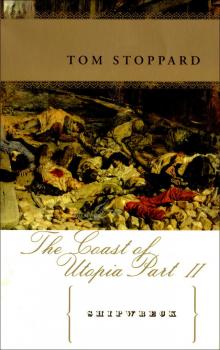 The Coast of Utopia: Voyage, Shipwreck, Salvage
The Coast of Utopia: Voyage, Shipwreck, Salvage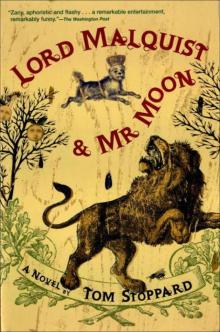 Lord Malquist & Mr. Moon
Lord Malquist & Mr. Moon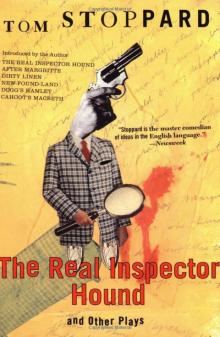 The Real Inspector Hound and Other Plays
The Real Inspector Hound and Other Plays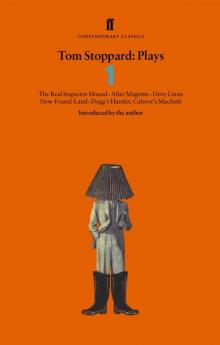 Tom Stoppard Plays 1
Tom Stoppard Plays 1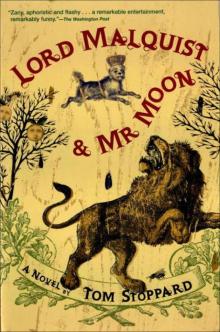 Lord Malquist & Mr. Moon: A Novel
Lord Malquist & Mr. Moon: A Novel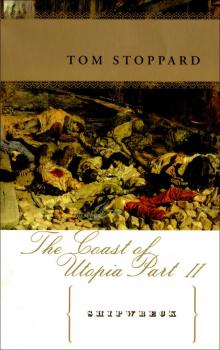 Shipwreck
Shipwreck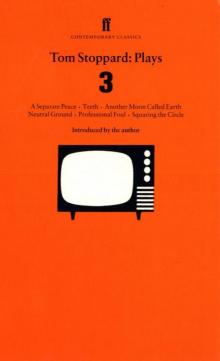 Tom Stoppard Plays 3
Tom Stoppard Plays 3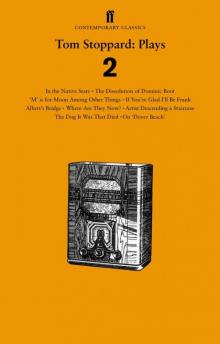 Tom Stoppard Plays 2
Tom Stoppard Plays 2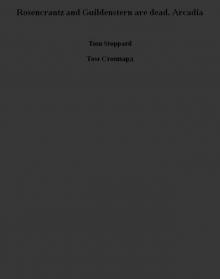 Rosencrantz and Guildenstern are dead. Arcadia
Rosencrantz and Guildenstern are dead. Arcadia